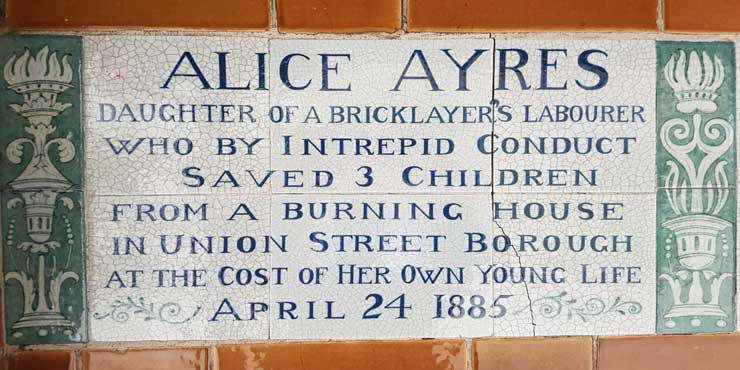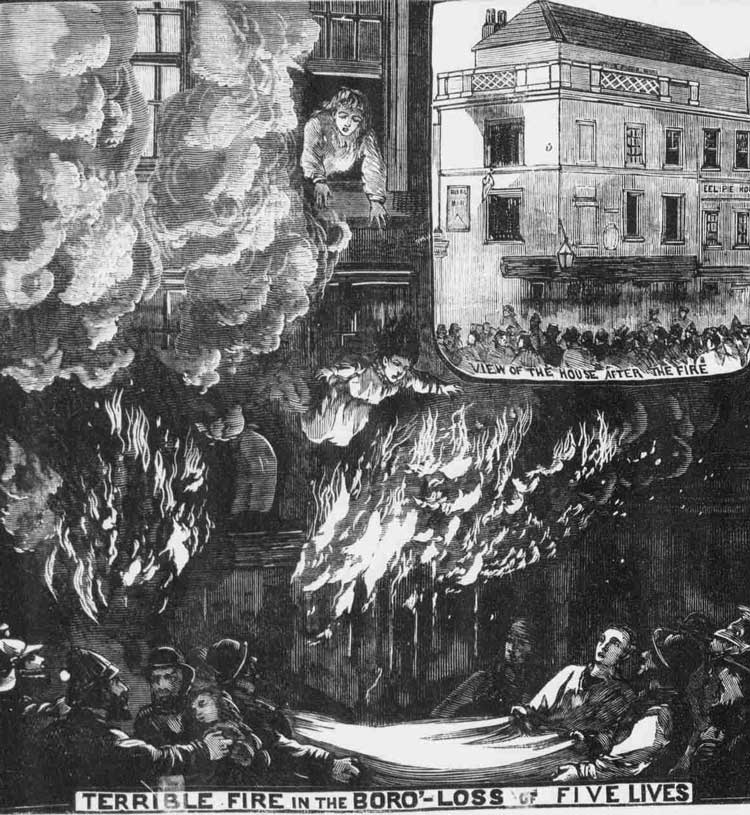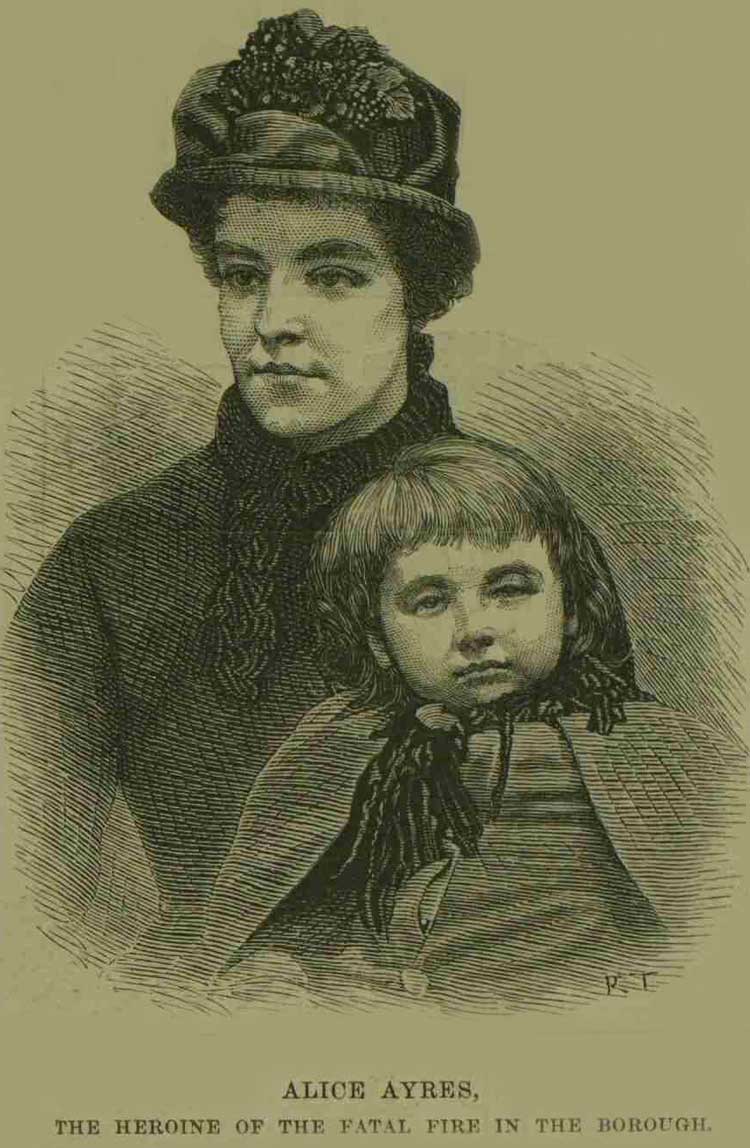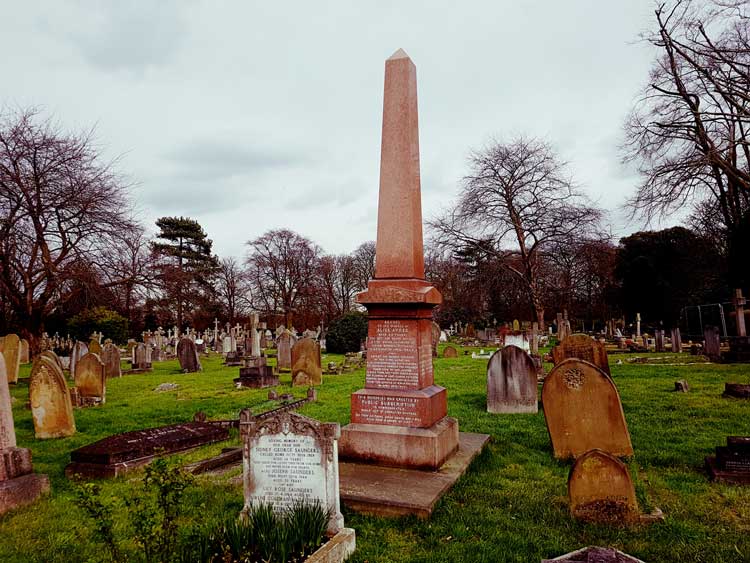
It Alice Ayres' brave act of heroic self sacrifice that Watts cited in his letter to The Times, which was published on the 5th September 1887, in which he called for a monument to be erected that would celebrate the sacrifices made by "likely to be forgotten heroes" by collecting "...a complete record of the stories of heroism in every-day life."
Consequently, when his Memorial eventually saw the light of day, the plaque remembering Alice Ayres (1859 - 1887) was one of the first to be unveiled.
The plaque reads, "Alice Ayres, Daughter Of A Bricklayer's Labourer, Who by Intrepid Conduct Saved 3 Children From A Burning House In Union Street, Borough, At The Cost Of Her Own Young Life. April 24 1885."
The Illustrated London News on the 2nd of May 1885 published the following brief summary of what had happened:-
"By a fire which occurred in an oil and colour shop at the corner of Gravel-lane and Union-street, Borough, early yesterday week, the proprietor, Mr. H. Chandler, his wife, and son, were burnt to death, and a domestic servant and three little girls were greatly injured.
The servant, Alice Ayres, with great courage and presence of mind in the terrible crisis, threw out a feather bed, on which she dropped the children; but in attempting to save herself she fell upon the ground and sustained dreadful injuries.
We regret to say that this heroic woman died on Sunday in Guy's Hospital, and one of the three children whom she threw out of the window is also dead."

Alice Ayres Rescuing A Child
From The Illustrated Police News 2nd May 1885
Copyright, The British Library Board
The Graphic in its edition of the same day had this to say:-
"A Fire broke out a little before two o'clock on the morning of Friday last week, in the house and shop of Mr. Chandler, oil and colourman, 194, Union Street, Borough.
It raged with such fury that, before the fire-escape could arrive from Blackfriars Bridge, the house was gutted, and Mr. and Mrs. Chandler, with their little boy, perished in the flames.
Three of their other children were rescued by the courage and coolness of Alice Ayres, a sister of Mrs. Chandler, who with rare presence of mind fetched a feather bed, pushed it through the window, whence it was caught by some of the crowd below, and stretched out by them in readiness for what was to happen.
Thrice she darted into the flames and smoke and reappeared at the window, whence on each occasion she threw a little niece of tender years to be caught in safety by those below.
But when her own turn came, the fumes of the smoke and the heat had unnerved her, and springing out of the window she struck in her descent against one of the large dummy jars above the front of the shop before falling head foremost on the bed.
She was immediately conveyed insensible to St. Thomas's Hospital, where she died on Sunday.
One of the hospital physicians told her of the praises bestowed on her courageous conduct by the public and the press, and the news seemed to give her pleasure.
The youngest of the little girls who was rescued has since died."
However, it is evident from reading the vast amount of newspaper coverage that Alice Ayres act of sacrifice generated that the press were universal in their admiration for the brave girl.
With the flames of the fire barely extinguished, The Pall Mall Gazette went to press with the following brief article on 25th April 1885:-
"The servant girl Alice Ayres, who saved the lives of three children in the fire in the Borough yesterday; has added another story to "the book of golden deeds."
It is no sentimental exaggeration to say that this latest tale of female heroism has never been surpassed by those which have come before.
That wives and mothers are capable of heroism now, worthy to stand beside that of Alcestis, and to make sacrifices, the more difficult because the less conspicuous, we all know.
But the heroism of Alice Ayres was greater still, for it can have been inspired by nothing else than sheer bravery and duty."
And, it wasn't just the London press that declared it's admiration for Alice Ayres and her act of selfless bravery.
Following the news that she had, in fact, died from her injuries, the Dundee Courier published the following article in its edition of 27th April 1885:-
"Yesterday morning there died in a London hospital a young woman who dared death that the children under her care might live.
On Saturday we gave a brief account of a fatal tire in the Metropolis, and today supply some details of a deed of as heroic daring as is to be found in the annals of heroism, and one which ought not to pass unnoticed.
In her way Alice Ayres performed an act as full of unhesitating self-sacrifice as that which has made the fame of Grace Darling worldwide, and her name a synonym for all that is devotedly disinterested and self-renouncing.
The young London servant girl, when she presented herself at the window of the burning dwelling, was called upon to jump to the street, the people below holding out some of their garments to break her fall.
But Alice Ayres, instead of doing as she was asked, disappeared, and soon came back dragging a feather bed with her.
With the greatest difficulty she managed to throw it over the window, and successively dropped after it the three children whom she had rescued from the flames.
The deed was done at the cost of her life. Overcome by the stilling fumes of the burning oil, she failed to throw herself down so as to fall on the bed, and she broke her spine in the fall.
Such a deed as that performed by Alice Ayres needs no eulogy, and scarcely needs record on monumental brass or marble.
But the influence for good of an act such as hers does not end with the passing away of its author."
The Illustrated London News published a further article on the tragedy in its edition of 9th May 1885, in which it went into more detail about how the events of the 24th of April had unfolded:-
"Death has taken from this world the humble heroine of a domestic tragedy; the brave young woman who stayed on the second floor of a burning house, attempting to save three children by dropping them from the window, having first thrown out a mattress that they might fall softly, and who received mortal injuries in descending after them.
Alice Ayres, the sister of Mrs. Chandler, living with the family at 194, Union-street, the oilman's shop, at the corner of Gravel-lane, in the Borough, performed this act of courageous self-devotion on Friday, the 24th ult.; and it was mentioned in our last issue.
She had slept in a room with her three little nieces, Edith, aged five, Ellen, four years old, and Elizabeth, three years old, when she was aroused by the noise of the fire at a quarter past two in the morning.
Her first thought, as the staircase was in flames, was to lower the children into the street by tying them to the sheets which she fastened together; but this would not do, and she then cast out the mattress, and let the three little girls, one after another, fall upon it.
This was a desperate expedient, and it did not entirely succeed, for the youngest child was killed, but there seemed no other chance of rescue.
The parents, Henry and Mary Ann Chandler, with a boy, Harry, their eldest child, six years of age, perished in another part of the house, apparently by suffocation.
When Alice Ayres had done what she thought was best to save the little girls, she let herself drop from the window; but, striking in her fall against something which turned her aside from the mattress beneath, she was terribly injured, and died within twenty-four hours after her removal to Guy's Hospital.
Of the whole family, only Edith and Ellen were saved.
A Portrait of Alice Ayres, who was twenty-six years of age, and unmarried, is given in this Number of our Journal.
Her funeral, in Isleworth Cemetery, was attended by a large assembly of people; sixteen of the Fire Brigade bore the coffin, and twenty young girls, dressed in white, brought flowers to the grave."

The Portrait of Alice Ayres
From The Illustrated London News 9th May 1885
Copyright, The British Library Board
In fact, the funeral had taken place on the afternoon of Monday 2nd May 1885, and the St James's Gazette carried the following article about it in its next day's edition:-
"The funeral of the late Alice Ayres, who distinguished herself so nobly and lost her own life at the fatal fire in Union-street, Borough, last Friday week, took place yesterday afternoon at Isleworth Cemetery.
Miss Ayres, it will be remembered, died in Guy's Hospital, whence her body was conveyed to the home of her parents at Magdala-terrace, Isleworth.
At 2.30 P.M. the cortege started on foot for the cemetery at that place.
The coffin was carried from the house to the grave by sixteen firemen, who relieved each other in sets of four.
On reaching the church at the cemetery a very impressive service was held, and a noticeable feature was the presence of twenty girls in white from the village school which the deceased herself had attended as a girl.
It had been arranged that these young people should have followed the coffin and sung at the graveside; but this was unfortunately prevented by a severe hail-storm which came on just as the service in the church was concluding.
A large assemblage of persons from the village and from London, however, saw the coffin lowered to its last resting-place.
The coffin was covered with wreaths of flowers, and bore the inscription - "Alice Ayres, died April 26, aged twenty-six."

Alice Ayres Grave
Isleworth Cemetery
Copyright, Richard Jones
There was, however, a tragic aftermath to the story of Alice Ayres.
It seems that the loss of her daughter impacted on the twilight years of her aged mother and, on 31st of March 1894, the following appeal appeared in The Canterbury Journal, Kentish Times and Framers's Gazette:-
"Six or seven years ago not only England but the whole English-speaking race was moved to tears and admiration by the noble heroism of a servant girl in the Borough, named Alice Ayres, who saved three of her master's children from death by fire, and lost her own life in the act.
The sad sequel to the brave act is touchingly narrated by "Dagonet", in the Referee.
After describing the death of Alice, Mr. G. R. Sims says, "Poems were written and recited in her honour, and for nine whole days she was a heroine, and a picture representing the deed hangs in Red Cross Hall.
But the practical reward of this noble sacrifice is this: Old Mrs Ayres, a respectable old woman of 72, having lost the support of her daughter, has in her old age become a pauper, and has been admitted to Brentford Workhouse, where the is engaged in the usual light and lively pauper duties of floor-scrubbing and mangling.
Alice Ayres was a brave, high-spirited girl, who would never have let her mother come to this, and I think we really might recognise her bravery with something more practical than poetry now that the opportunity offers.
She died a noble death. She gave her life for her master's children. She shewed of what splendid stuff the much-abused domestic servant may be made, and the mother of the humble heroin with whose praises the world once rang should not be allowed to end her days in the workhouse.
If only a few of those who think that Alice Ayres did her calling, her womanhood, and her nationality honour by her brave deed will help me, we will stop that which would be a public disgrace, and get enough money together to give the mother of one of England's heroines an honourable competence for her last years."
Every British man and woman ought not only to agree with Mr. Sims's sentiment, but cordially assist him in his laudable endeavour."